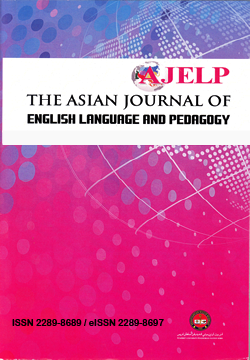Socio-Historical Reading of Harold Pinter's The Room from Georg Lukács’ Perspective
DOI:
https://doi.org/10.37134/ajelp.vol11.1.4.2023Keywords:
comedy of menace, Georg Lukács, Harold Pinter, Historical Drama, Mass-reproduction, ResistanceAbstract
Considered by critics the earliest example of Harold Pinter's "comedy of menace", The Room is Harold Pinter's first play, written and first produced in 1957. Although stylistic features of the play have been studied by many scholars, socio-historical readings of the play have been neglected. In this article, a new approach of reading will be suggested that considers social and historical elements of the play, in addition to the form and stylistic features. Using Georg Lukács’ theories regarding historical drama, this research aims to show how Harold Pinter’s The Room depicts capitalistic reproduction and social threats the working class faces in a world that forces classes to engage in the internal social competition, where one always is doomed in falling out of socio-economical order. Although Lukács bases the definition of the historical novels on Shakespearean’s historical dramas, it will be showcased how Lukacsian concepts like totality, anachronism, and distance forms a socio-ideological product in Pinter’s The Room. The play becomes essentially interesting applying Lukács’ theories regarding aesthetic and social elements of drama. Exploring The Room’s historical significance by highlighting Lukács’ notions such as distance, totality, and character’s social struggles, Pinter portrays a picture of a proletariat collision that results in a fatal resistance, where maintaining individuals revolute against the capitalistic mass-reproduction to become world-historical figures, which as we see at the end of the play, is necessarily obnoxious.
Downloads
References
Aliakbari, H. & Pourgiv, F. (2006). Harold Pinter: The Absurdist-Existentialist Playwright. Journal of Social Sciences and Humanities of Shiraz University. 23(1). 2-10 https://www.sid.ir/FileServer/JE/103120064601.pdf
Andrews, J. (2008). Interviews: Harold Pinter's “The Room”. The University of Sheffield.
Bond, P. (2009). Harold Pinter: Independent and Critical to the Last. World Socialist Web Site. https://www.wsws.org/en/articles/2009/01/pint-j05.html
Brown, John Russell. (1982). A Short Guide to Modern British Drama. London: Heinemann Educational Books Ltd.
Georg, L. (1908). Soul and Form. Columbia University Press.
Georg, L. (1950). Essays on Realism, The MIT Press.
Georg, L. (1983). The Historical Novel. University of Nebraska Press.
Harris Smith, S. (2006). American Drama: A Bastard Art. Cambridge University Press.
Kavoulakos, K. (2015). “The Drama in an Age of Fragmentation: Toward a New Reading of Georg Lukács’s Evolutionary History of the Modern Drama”. New German Critique, 124, 23–44. http://www.jstor.org/stable/43910656
Lenin, V. (1984). “The Proletarian Revolution and the Renegade Kautsky”. Collected Works, Vol. 28,
Maher Mhayyal, B.A. (2017). “The Dramatic Value of ‘Pauses’ in Harold Pinter’s The Room”. Special Fifth Scientific Conference for the year 2017. AL-USTATH. Unversity of Baghdad, Iraq.
Özmen Akdoğan, Ö. (2016). Social Criticism through Elements of Dystopian Narrative in Harold Pinter's Political Drama: One for the Road (1984) and Party Time (1991). Hacettepe University Journal of Faculty of Letters. 37(2). 330-340. https://www.researchgate.net/publication/308167055_Social_Criticism_through_Elements_of_Dystopian_Narrative_in_Harold_Pinter's_Political_Drama_One_for_the_Road_1984_and_Party_Time_1991
Pinter, H. (1957). The Room. First published by Eyre Methuen.
Printz-Påhlson, G. (1990). “Historical Drama and Historical Fiction: The Example of Strindberg”. Scandinavian Studies, Menasha, Wis. Vol. 62, No. 1.
Shaw, B. J. (1988). “Capitalism and the Novel Georg Luckacs on Modern Realism”. History of Political Thought, 9(3), 553–573. http://www.jstor.org/stable/26213800
Downloads
Published
Issue
Section
License
Copyright (c) 2023 Ali Masoudi, Mr., Hoda Shabrang

This work is licensed under a Creative Commons Attribution-NonCommercial-ShareAlike 4.0 International License.





